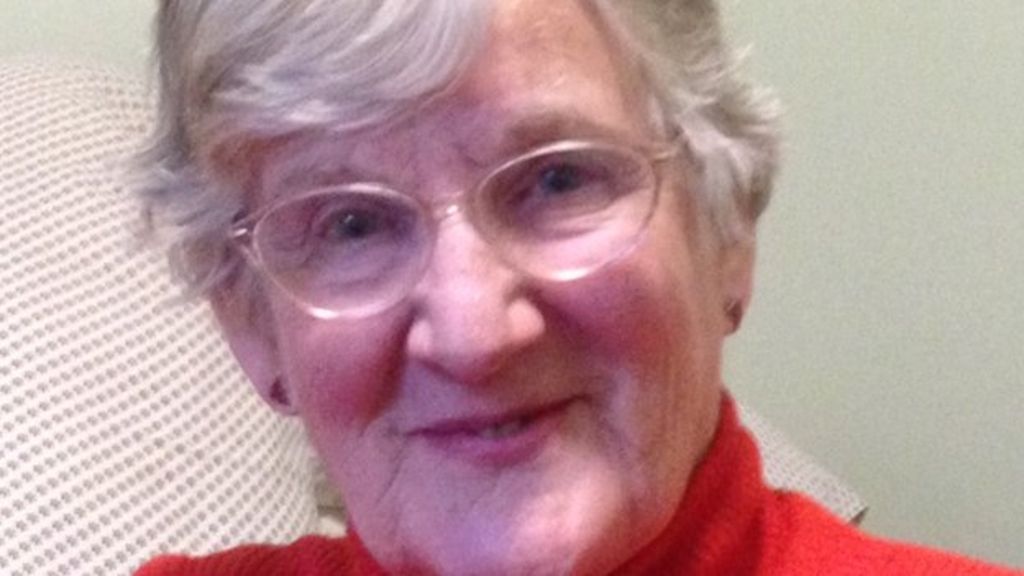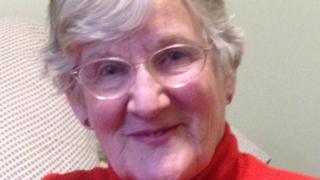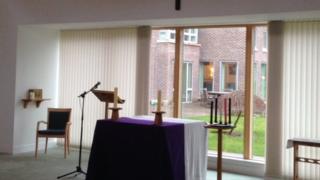Clergy fight to save their nursing home – BBC News


A group of retired clergy has vowed to fight plans to close a flagship Church of England nursing home.
The Manormead home in Hindhead, Surrey is scheduled to shut in March.
The Church of England says it is having difficulty recruiting and retaining staff.
But the elderly residents say they face being separated from their spouses and are having problems finding alternative accommodation.
Manormead, a combination of a nursing home and supported living accommodation, looks after 30 residents and includes a dementia wing.
Dorothy Butt, 86, is one of the 14 dementia sufferers who will have to leave by the end of March.
Her advanced condition means she is unaware of the upheaval, but her 85-year-old husband, retired vicar the Reverend Roy Butt, says he “carries a burden for her”, wondering what she would want him to do.

Mr Butt lives in the supported accommodation wing and walks through to sit with his wife at least twice a day.
Close to tears, he tells me: “I could stay here I understand, but then Dorothy would have to go somewhere else and we’ve been so close, married 62 years, I wouldn’t want to be far away from her.
“She went into respite care last year for a week. It was a great hardship to me. It’s really rather difficult as we face the future.”
All the residents at Manormead are either retired clergy or their wives. A small chapel is the heart of the home, where residents from the supported living side come together on Sundays with residents from the nursing home.
Christine Law has started the process of trying to find a new home for her husband Richard, who has been at Manormead since 2014.
She only moved in a fortnight before the Church of England’s Pensions Board, which owns the property, announced it was to close.
She says she would not have moved if she had known of the proposals, about which the residents claim none of them were consulted.
Christine and her son John were heading off to visit an alternative home on the afternoon I visited.
“We’ve looked at a couple over recent days,” says John. “The reality is virtually all care facilities that have specialised dementia units are full, so at best you get put on a waiting list – if you can find a good place.
“So there is absolutely no guarantee that even if we find somewhere, there will be a place for my dad come the end of March.”

The home was rated as Good by the regulator, the Care Quality Commission, earlier this month.
All the families talk extremely positively about the care their relatives receive, describing staff as sensitive, engaging and approachable.
Fees are around 1,000 a week and are paid through a mixture of savings and pensions, local authority contributions and top-ups from the Church.
The Pensions Board have said no-one will be financially worse off as a result of moving to a different home.
Manormead was expanded in 2013 and residents were blindsided by the decision to close it.
Some are wondering if the Church plans to sell the building – they suspect housing developers would pay millions for the land in a leafy, prosperous commuter area in Surrey.
The Church would only say it plans to mothball the building.
The Church of England is not the only institution struggling to find nursing staff.
In September, the regulator reported that at least one nursing home is closing every week in England because of staff shortages.

A Church of England spokesman said: “Our key priority is the ongoing and successful relocation of our approximately 30 residents. We continue to be in close and fruitful discussions with residents, their families and staff during these four months leading up to closure.”
The Reverend Peter Chapman, who lives with his wife Celia in a supported living flat, was away for a few days holiday when the closure plans became public and says he returned to a “shell-shocked community, reeling from the announcement”.
They moved to Manormead, specifically as the nursing home was on site, in case either of them needed additional support as they get older.
He is now organising to keep the home open, writing to the Church’s leadership, including the Archbishop of Canterbury, as well as the Pensions Board and local MP, Health Secretary Jeremy Hunt.
“We’ve come to a mind that we actually have to resist this,” he tells me.
Residents question whether the Church considered paying higher wages to attract staff or providing them with accommodation on site. The Church refused to comment.
“The Pensions Board are throwing away a tremendous asset,” says Mr Chapman.
“This is a supportive community – people of a range of ages and a range of health conditions, living together and supporting each other. It’s a model beyond what the church is providing for its clergy, it’s a model for wider society.”

- Care: The problem no-one can fix
- The alternative options
- How the care system works across the UK
- The daily struggle to discharge patients
The BBC has produced an online guide to the system which shows how it works and how much care costs wherever you live in the UK.
Find out the cost of care in your area






Home care

What is home care?
You stay in your own home while getting help with everyday tasks such as washing, dressing and eating.
How your council helps with care
EXPLAINER TITLE
average amount of care provided per week, by your council
![]()
average paid per hour by your council, 2014-15
![]()
average paid per hour in your region if you pay for your own care, 2016
Residential care

What is residential care?
You live in a care home that provides round-the-clock support with everyday tasks.
How your council helps with care
Average contribution per week
Paying for yourself
TBC pay for their own care



Nursing home care

What is nursing home care?
You live in a care home which provides round-the-clock support for everyday tasks and nursing care. Depending on your medical needs, the NHS may contribute to your costs.
How your council helps with care
Average contribution per week
Paying for yourself
TBC pay for their own care



Who gets help?

How is your contribution decided?
Your home

Savings, investments and income are assessed, along with the value of your home – unless you or a close relative live there.
Will I have anything left?
Want to know more?

The future of care
Useful links

Read more: http://www.bbc.co.uk/news/health-38382706